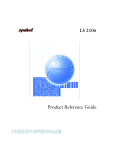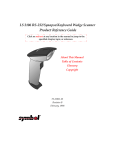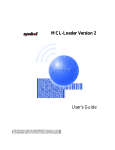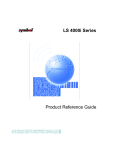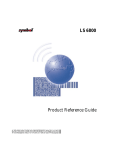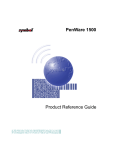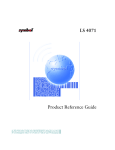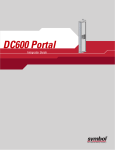Download Symbol Technologies LS2100 Scanner User Manual
Transcript
LS 2100 Product Reference Guide LS 2100 Product Reference Guide 70-32818-01 Revision B — April 2001 vi Symbol Technologies, Inc. One Symbol Plaza, Holtsville N.Y. 11742 LS 2100 Undecoded Scanner Product Reference Guide 70-32818-01 Revision B April 2001 © 2001 by Symbol Technologies, Inc. All rights reserved. No part of this publication may be reproduced or used in any form, or by any electrical or mechanical means, without permission in writing from Symbol. This includes electronic or mechanical means, such as photocopying, recording, or information storage and retrieval systems. The material in this manual is subject to change without notice. The software is provided strictly on an “as is” basis. All software, including firmware, furnished to the user is on a licensed basis. Symbol grants to the user a non-transferable and non-exclusive license to use each software or firmware program delivered hereunder (licensed program). Except as noted below, such license may not be assigned, sublicensed, or otherwise transferred by the user without prior written consent of Symbol. No right to copy a licensed program in whole or in part is granted, except as permitted under copyright law. The user shall not modify, merge, or incorporate any form or portion of a licensed program with other program material, create a derivative work from a licensed program, or use a licensed program in a network without written permission from Symbol. The user agrees to maintain Symbol’s copyright notice on the licensed programs delivered hereunder, and to include the same on any authorized copies it makes, in whole or in part. The user agrees not to decompile, disassemble, decode, or reverse engineer any licensed program delivered to the user or any portion thereof. Symbol reserves the right to make changes to any software or product to improve reliability, function, or design. Symbol does not assume any product liability arising out of, or in connection with, the application or use of any product, circuit, or application described herein. No license is granted, either expressly or by implication, estoppel, or otherwise under any Symbol Technologies, Inc., intellectual property rights. An implied license only exists for equipment, circuits, and subsystems contained in Symbol products. Symbol, Spectrum One, and Spectrum24 are registered trademarks of Symbol Technologies, Inc. Other product names mentioned in this manual may be trademarks or registered trademarks of their respective companies and are hereby acknowledged. Symbol Technologies, Inc. One Symbol Plaza Holtsville, New York 11742-1300 http://www.symbol.com Contents Chapter . About This Guide Notational Conventions . . . . . . . . . . . . . . . . . . . . . . . . . . . . . . . . . . . . . . . . . . . . . . . . . . . . . . . . . . . v Related Publications . . . . . . . . . . . . . . . . . . . . . . . . . . . . . . . . . . . . . . . . . . . . . . . . . . . . . . . . . . . . . . v Service Information . . . . . . . . . . . . . . . . . . . . . . . . . . . . . . . . . . . . . . . . . . . . . . . . . . . . . . . . . . . . . . v Symbol Support Center . . . . . . . . . . . . . . . . . . . . . . . . . . . . . . . . . . . . . . . . . . . . . . . . . . . . . . . .vi Warranty . . . . . . . . . . . . . . . . . . . . . . . . . . . . . . . . . . . . . . . . . . . . . . . . . . . . . . . . . . . . . . . . . . . . . vii Warranty Coverage and Procedure . . . . . . . . . . . . . . . . . . . . . . . . . . . . . . . . . . . . . . . . . . . . . .viii General . . . . . . . . . . . . . . . . . . . . . . . . . . . . . . . . . . . . . . . . . . . . . . . . . . . . . . . . . . . . . . . . . . .viii Chapter 1. Setting Up the LS 2100 Introduction . . . . . . . . . . . . . . . . . . . . . . . . . . . . . . . . . . . . . . . . . . . . . . . . . . . . . . . . . . . . . . . . . . 1-1 Audience. . . . . . . . . . . . . . . . . . . . . . . . . . . . . . . . . . . . . . . . . . . . . . . . . . . . . . . . . . . . . . . . . . . . . 1-2 Unpacking . . . . . . . . . . . . . . . . . . . . . . . . . . . . . . . . . . . . . . . . . . . . . . . . . . . . . . . . . . . . . . . . . . . 1-2 Setting Up the LS 2100. . . . . . . . . . . . . . . . . . . . . . . . . . . . . . . . . . . . . . . . . . . . . . . . . . . . . . . . . . 1-3 Installing the Cable . . . . . . . . . . . . . . . . . . . . . . . . . . . . . . . . . . . . . . . . . . . . . . . . . . . . . . . . . 1-3 Switching Cables . . . . . . . . . . . . . . . . . . . . . . . . . . . . . . . . . . . . . . . . . . . . . . . . . . . . . . . . . . . 1-3 Connecting to a Host . . . . . . . . . . . . . . . . . . . . . . . . . . . . . . . . . . . . . . . . . . . . . . . . . . . . . . . 1-4 Chapter 2. Scanning with the LS 2100 Introduction . . . . . . . . . . . . . . . . . . . . . . . . . . . . . . . . . . . . . . . . . . . . . . . . . . . . . . . . . . . . . . . . . . 2-1 Scanning with the LS 2100 . . . . . . . . . . . . . . . . . . . . . . . . . . . . . . . . . . . . . . . . . . . . . . . . . . . . . . . 2-1 Aiming the Scanner . . . . . . . . . . . . . . . . . . . . . . . . . . . . . . . . . . . . . . . . . . . . . . . . . . . . . . . . . 2-2 LS 2100 Decode Zone . . . . . . . . . . . . . . . . . . . . . . . . . . . . . . . . . . . . . . . . . . . . . . . . . . . . . . . . . . 2-4 Chapter 3. Maintenance and Specifications Introduction . . . . . . . . . . . . . . . . . . . . . . . . . . . . . . . . . . . . . . . . . . . . . . . . . . . . . . . . . . . . . . . . . . 3-1 Maintenance. . . . . . . . . . . . . . . . . . . . . . . . . . . . . . . . . . . . . . . . . . . . . . . . . . . . . . . . . . . . . . . . . . 3-1 Troubleshooting . . . . . . . . . . . . . . . . . . . . . . . . . . . . . . . . . . . . . . . . . . . . . . . . . . . . . . . . . . . . . . . 3-1 iii LS 2100 Product Reference Guide Accessories. . . . . . . . . . . . . . . . . . . . . . . . . . . . . . . . . . . . . . . . . . . . . . . . . . . . . . . . . . . . . . . . . . . . 3-2 Standard Accessories: . . . . . . . . . . . . . . . . . . . . . . . . . . . . . . . . . . . . . . . . . . . . . . . . . . . . . . . .3-2 Cables . . . . . . . . . . . . . . . . . . . . . . . . . . . . . . . . . . . . . . . . . . . . . . . . . . . . . . . . . . . . . . . . . . . 3-2 Optional Accessories . . . . . . . . . . . . . . . . . . . . . . . . . . . . . . . . . . . . . . . . . . . . . . . . . . . . . . . .3-3 Technical Specifications . . . . . . . . . . . . . . . . . . . . . . . . . . . . . . . . . . . . . . . . . . . . . . . . . . . . . . . . . . 3-3 LS 2100 Signal Descriptions . . . . . . . . . . . . . . . . . . . . . . . . . . . . . . . . . . . . . . . . . . . . . . . . . . . . . .3-5 Glossary iv About This Guide The LS 2100 Undecoded Scanner Product Reference Guide provides general instructions for the setup, programming, operation, troubleshooting, and maintenance of the LS 2100 scanner. Notational Conventions The following conventions are used in this document: ! ! Bullets (!) indicate: " action items " lists of alternatives " lists of required steps that are not necessarily sequential Sequential lists (e.g., those that describe step-by-step procedures) appear as numbered lists. Related Publications ! ! ! LS 2100 Series Quick Reference Guide LS 2104 Product Reference Guide LS 2106 Product Reference Guide p/n 70-32817-xx p/n 70-32820-xx p/n 70-32821-xx Service Information If you have a problem with your equipment, contact the Symbol Support Center for your region. See page vi for contact information. Before calling, have the model number, serial number, and several of your bar code symbols at hand. Call the Support Center from a phone near the scanning equipment so that the service person can try to talk you through your problem. If the equipment is found to be working properly and the problem is symbol readability, the Support Center will request samples of your bar codes for analysis at our plant. v LS 2100 Product Reference Guide If your problem cannot be solved over the phone, you may need to return your equipment for servicing. If that is necessary, you will be given specific directions. Note: Symbol Technologies is not responsible for any damages incurred during shipment if the approved shipping container is not used. Shipping the units improperly can possibly void the warranty. If the original shipping container was not kept, contact Symbol to have another sent to you. Symbol Support Center For service information, warranty information or technical assistance contact or call the Symbol Support Center in: United States Symbol Technologies, Inc. One Symbol Plaza Holtsville, New York 11742-1300 1-800-653-5350 Canada Symbol Technologies Canada, Inc. 2540 Matheson Boulevard East Mississauga, Ontario, Canada L4W 4Z2 905-629-7226 United Kingdom Symbol Technologies Symbol Place Winnersh Triangle, Berkshire RG41 5TP United Kingdom 0800 328 2424 (Inside UK) +44 208 945 7529 (Outside UK) Asia/Pacific Symbol Technologies Asia, Inc. 230 Victoria Street #04-05 Bugis Junction Office Tower Singapore 188024 337-6588 (Inside Singapore) +65-337-6588 (Outside Singapore) Australia Symbol Technologies Pty. Ltd. 432 St. Kilda Road Melbourne, Victoria 3004 1-800-672-906 (Inside Australia) +61-3-9866-6044 (Outside Australia) Austria Symbol Technologies Austria GmbH Prinz-Eugen Strasse 70 Suite 3 2.Haus, 5.Stock 1040 Vienna, Austria 1-505-5794 (Inside Austria) +43-1-505-5794 (Outside Austria) Denmark Symbol Technologies AS Gydevang 2, DK-3450 Allerod, Denmark 7020-1718 (Inside Denmark) +45-7020-1718 (Outside Denmark) Europe/Mid-East Distributor Operations Contact your local distributor or call +44 208 945 7360 Finland Oy Symbol Technologies Kaupintie 8 A 6 FIN-00440 Helsinki, Finland 9 5407 580 (Inside Finland) +358 9 5407 580 (Outside Finland) France Symbol Technologies France Centre d'Affaire d'Antony 3 Rue de la Renaissance 92184 Antony Cedex, France 01-40-96-52-21 (Inside France) +33-1-40-96-52-50 (Outside France) vi About This Guide Germany Symbol Technologies GmbH Waldstrasse 68 D-63128 Dietzenbach, Germany 6074-49020 (Inside Germany) +49-6074-49020 (Outside Germany) Italy Symbol Technologies Italia S.R.L. Via Cristoforo Columbo, 49 20090 Trezzano S/N Navigilo Milano, Italy 2-484441 (Inside Italy) +39-02-484441 (Outside Italy) Latin America Sales Support 7900 Glades Road Suite 340 Boca Raton, Florida 33434 USA 1-800-347-0178 (Inside United States) +1-561-483-1275 (Outside United States) Mexico Symbol Technologies Mexico Ltd. Torre Picasso Boulevard Manuel Avila Camacho No 88 Lomas de Chapultepec CP 11000 Mexico City, DF, Mexico 5-520-1835 (Inside Mexico) +52-5-520-1835 (Outside Mexico) Netherlands Symbol Technologies Kerkplein 2, 7051 CX Postbus 24 7050 AA Varsseveld, Netherlands 315-271700 (Inside Netherlands) +31-315-271700 (Outside Netherlands) Norway Symbol Technologies Trollasveien 36 Postboks 72 1414 Trollasen, Norway 66810600 (Inside Norway) +47-66810600 (Outside Norway) South Africa Symbol Technologies Africa Inc. Block B2 Rutherford Estate 1 Scott Street Waverly 2090 Johannesburg Republic of South Africa 11-4405668 (Inside South Africa) +27-11-4405668 (Outside South Africa) Spain Symbol Technologies S.A. Edificioi la Piovera Azul C. Peonias, No. 2 - Sexta Planta 28042 Madrid, Spain 9-1-320-39-09 (Inside Spain) +34-9-1-320-39-09 (Outside Spain) Sweden Symbol Technologies AB Albygatan 109D Solna Sweden 84452900 (Inside Sweden) +46 84452900 (Outside Sweden) If you purchased your Symbol product from a Symbol Business Partner, contact that Business Partner for service. Warranty Symbol Technologies, Inc (“Symbol”) manufactures its hardware products in accordance with industrystandard practices. Symbol warrants that for a period of twelve (12) months from date of shipment, products will be free from defects in materials and workmanship. -vii LS 2100 Product Reference Guide This warranty is provided to the original owner only and is not transferable to any third party. It shall not apply to any product (i) which has been repaired or altered unless done or approved by Symbol, (ii) which has not been maintained in accordance with any operating or handling instructions supplied by Symbol, (iii) which has been subjected to unusual physical or electrical stress, misuse, abuse, power shortage, negligence or accident or (iv) which has been used other than in accordance with the product operating and handling instructions. Preventive maintenance is the responsibility of customer and is not covered under this warranty. Wear items and accessories having a Symbol serial number, will carry a 90-day limited warranty. Nonserialized items will carry a 30-day limited warranty. Warranty Coverage and Procedure During the warranty period, Symbol will repair or replace defective products returned to Symbol’s manufacturing plant in the US. For warranty service in North America, call the Symbol Support Center at 1-800-653-5350. International customers should contact the local Symbol office or support center. If warranty service is required, Symbol will issue a Return Material Authorization Number. Products must be shipped in the original or comparable packaging, shipping and insurance charges prepaid. Symbol will ship the repaired or replacement product freight and insurance prepaid in North America. Shipments from the US or other locations will be made F.O.B. Symbol’s manufacturing plant. Symbol will use new or refurbished parts at its discretion and will own all parts removed from repaired products. Customer will pay for the replacement product in case it does not return the replaced product to Symbol within 3 days of receipt of the replacement product. The process for return and customer’s charges will be in accordance with Symbol’s Exchange Policy in effect at the time of the exchange. Customer accepts full responsibility for its software and data including the appropriate backup thereof. Repair or replacement of a product during warranty will not extend the original warranty term. Symbol’s Customer Service organization offers an array of service plans, such as on-site, depot, or phone support, that can be implemented to meet customer’s special operational requirements and are available at a substantial discount during warranty period. General Except for the warranties stated above, Symbol disclaims all warranties, express or implied, on products furnished hereunder, including without limitation implied warranties of merchantability and fitness for a particular purpose. The stated express warranties are in lieu of all obligations or liabilities on part of Symbol for damages, including without limitation, special, indirect, or consequential damages arising out of or in connection with the use or performance of the product. Seller’s liability for damages to buyer or others resulting from the use of any product, shall in no way exceed the purchase price of said product, except in instances of injury to persons or property. Some states (or jurisdictions) do not allow the exclusion or limitation of incidental or consequential damages, so the proceeding exclusion or limitation may not apply to you. viii Chapter 1 Setting Up the LS 2100 Introduction The LS 2100 Series of hand-held laser scanners offers excellent performance in retail and light industrial applications. Advanced ergonomic design ensures comfortable use for extended periods of time. The LS 2100 Series hand-held scanner is based on the SE 1200 Series scan engine with Visible Laser Diode (VLD) and mylar ® scan element. This state of the art technology gives the scanner a wider decode zone, greater depth of field, and a visible scan beam. This series reads color bar codes and symbols printed on all substrates. See the LS 2100 Decode Zone on page 2-4. Figure 1-1. LS 2100 Scanner Here’s what each member of the LS 2100 family offers you: ! LS 2100 - The aggressiveness of this discrete scanner is typical of the LS 2100 family’s performance. It connects easily to, and is programmed by, the 1-1 LS 2100 Product Reference Guide ! complete line of Symbol Technologies portable terminals and the full range of SYMBOL and OmniLinkTM interface controllers. LS 2104 - With a simple cable change, this scanner is compatible with: " RS 232C asynchronous terminals " SynapseTM “Smart Cables”, which allow you to connect to: " IBM 4683/4, 4693/4 series of terminals " All leading OCIA terminals, including NCR, Nixdorf, and ICL terminals " Popular OCR terminals, such as Fujitsu and ICL. " Wand Emulation terminals " Dual RS-232 Hosts ! LS 2106 - The LS 2106 scanner is a keyboard “wedge” interface which adds efficient, reliable bar code reading to your PS/2or AT/XT terminal. Since entered scan data is transmitted as keystrokes, no software changes to the host system are necessary. The scanner contains on-board discrete keyboard wedge communications for connecting to asynchronous terminals and host systems. It can also accommodate any of the Synapse™ “Smart Cables” which allows you to connect to a wide variety of host systems. Some installations require one cable; others require additional adapters between the keyboard, the PC, and the y-cable. All of the LS 2100 series scan automatically at the rate of 36 scans per second. For decode capability, see Technical Specifications on page 3-3. Audience The intended audience for this manual is personnel performing installation/setup and programming of LS 2100 scanners. Unpacking Remove the LS 2100 from its packing and inspect it for damage. If the scanner was damaged in transit, call the Symbol Support Center at one of the telephone numbers listed on page vi. KEEP THE PACKING. It is the approved shipping container and should be used if you ever need to return your equipment for servicing. 1-2 Setting Up the LS 2100 Setting Up the LS 2100 Installing the Cable Insert the cable into the receptacle on the bottom of the scanner, as shown below: Figure 1-2. Installing the Cable Switching Cables Different cables are required for different hosts. To change the scanner cable: 1. Press the tab on the cable with a small screwdriver. 2. Pull the cable out of the receptacle on the bottom of the scanner. 1-3 LS 2100 Product Reference Guide 3. Insert a new cable in the receptacle. Press the cable firmly into the receptacle until you hear a click. Connecting to a Host Plug the connector at the end of the LS 2100 cable into the appropriate port on the Symbol interface controller or portable terminal. Refer to the controller user documentation for full details. LS 2100 Interface Controller Portable Data Terminal LS 2100 Figure 1-3. Connecting to a Host 1-4 Host Computer Chapter 2 Scanning with the LS 2100 Introduction This chapter covers the proper techniques for scanning bar codes and the decode zone for the LS 2100 scanner. Scanning with the LS 2100 1. Before you use the scanner, make sure all cable connections are secure. 2. Make sure the bar code is in the correct scanning range. Aim and press the trigger; the scan beam lights and an orange light illuminates at the rear of the scanner. The scanner has read the symbol when: " You hear a beep. " The orange light turns green. " The laser turns off. 2-1 LS 2100 Product Reference Guide Figure 2-1. Holding the Scanner Aiming the Scanner Hold the scanner at an angle. Do not hold the scanner directly over the bar code. Laser light reflecting directly back into the scanner from the bar code is known as specular reflection. This strong light can “blind” the scanner and make decoding difficult. The area where specular reflection occurs is known as a “dead zone”. You can tilt the scanner up to 55 ° forward or back and achieve a successful decode. Simple practice quickly shows what tolerances to work within. Figure 2-1. Aiming the Scanner 2-2 Scanning with the LS 2100 ! Scan the Entire Symbol " The scan beam must cross every bar and space on the symbol (as in the left bar code below). " The larger the symbol, the farther away you should hold the scanner. " Hold the scanner closer for symbols with bars that are close together. Right Wrong What Does The Beep Mean? When you hear 1 beep (short high tone) it means data has been decoded successfully. If any other beeps are heard, contact the technical person in charge of scanning. When the symbol has been decoded, you will hear a short, high-tone beep, and the green decode LED will light. 2-3 LS 2100 Product Reference Guide LS 2100 Decode Zone 2-4 Chapter 3 Maintenance and Specifications Introduction This chapter covers the appropriate methods for maintaining and the technical specifications for the scanner. Maintenance Cleaning the exit window is the only maintenance required. A dirty window may affect scanning accuracy. ! ! ! ! ! Do not allow any abrasive material to touch the window. Remove any dirt particles with a damp cloth. Wipe the window using a tissue moistened with ammonia/water. Do not spray water or other cleaning liquids directly into the window. Do not remove the nose of the scanner. Troubleshooting If, after following the operating instructions, the scanner does not work: ! ! ! Check the system power. Make sure the controller is programmed to decode bar codes of the symbology you are scanning. Check for loose cable connections. 3-1 LS 2100 Product Reference Guide ! ! Make sure the symbol is not defaced. Try scanning test symbols of the same code type. If after performing these checks the symbol still does not scan, contact your distributor or call the Symbol Support Center. See page vi for the telephone number. Accessories Standard Accessories: Description Part Number LS 21xx Series Quick Reference Guide 70-32817-xx LS 2100 Undecoded Scanner Product Reference Guide 70-32818-01 Shipping Box 50-01400-184 Cables Description Part Number Standard (9-pin D Connector - Female) Straight Cable 25-06751-01 Coil Cable for PDT 3300 (9-pin D Connector) 25-05611-03 RJ-41 Connector for PDT 1510 25-06859-01 Coil Cable for UDI Portable Data Terminals (DB-9 Female Connector) 25-08185-01 3-2 Maintenance and Specifications Optional Accessories Optional accessories, supplied at extra cost, include additional units of any item listed above and the following items: Description Part Number Hands-free Stand-Free Standing 21-33324-01 Desk-mount Stand 21-33323-01 Technical Specifications Item Description Power Requirements 4.75 to 14 VDC; 99 mA @ 5 VDC Typical Decode Capability Determined by interface controller Decode Depth of Field Maximum typical working distance is 11 in. (100% UPC/EAN); minimum element width resolution is 5.5 mils Scan Repetition Rate Approximately 36 scans/sec (bidirectional) Roll Tolerance ± 55° min. (from normal) Pitch Tolerance ± 50° (from normal) Yaw Tolerance ± 35° min (from normal) Print Contrast Minimum 20% minimum reflectance differential, measured at 675 nm. Ambient Light Immunity Immune to direct exposure to normal office and factory lighting conditions, as well as direct exposure to sunlight. Durability 5 ft (152 cm) drops to concrete Operating Temperature 32° to 104°F (0° to 40°C) Storage Temperature -40° to 140° (-40° to 60°C) Straight Cable Length 6 ft (183 cm) 3-3 LS 2100 Product Reference Guide Item Weight (without cable) Description 5.5 oz. (170 gm) Dimensions: 3-4 Height 6.7 in (167 mm) Width 2.8 in (70 mm) Depth 3.4 in (85 mm) Maintenance and Specifications LS 2100 Signal Descriptions The following signal descriptions apply to the connection between the scanner and the cable, and are for reference only. Pin Signal Name Function 2 Power This pin is to be connected to the 4.75 to 14 V (4.75 to 14 VDC) power supply. When pin 4 is high, current to operate the scanner is supplied by pin 1,2 (99 mA @ 5 VDC). When pin 4 is at ground potential, current into pin 1 and 2 is less than 50 µA. 3 Ground Power supply and signal ground return line. 4 Enable When the decode logic senses that the trigger has been pulled, this input must be driven high (+2.4 to +14 V into a 10 kilohm load) to power-up the scanner electronics and turn on the laser and resonating harmonic scan element. As soon as a decode is successfully completed, if no decode occurs after about 1 second, or when the trigger is released, this input should float or be driven to ground (less than 0.4 V) to power-down the scanner. 5 Start of Scan This output synchronizes the decode logic with the scanner. The output is high when the beam sweeps in one direction and low when it sweeps in the opposite direction. This open collector signal is capable of sinking 25 mA. An external pullup resistor may be connected to any voltage up to 20 V. The frequency of scans is 36 scans/sec. 6 Trigger Switch This output is grounded when the trigger is pulled and floating when the trigger is released. The decode logic uses this switch to signal that the operator wishes to read a bar code. 7 Decode LED This input to the scanner controls the green decode indicator LED and sounds the beeper. Applying a voltage of 2.5 V or greater will light the LED. Maximum voltage that can be applied to this input is 15 V. This current decreases as the voltage is lowered. The decode LED can be activated with this input even when the scanner is not operating, providing power is present at pin 2. 3-5 LS 2100 Product Reference Guide Pin 8 Signal Name Digitized Bar Pattern Function Output from the scanner is electrically identical to pin 5, providing a series of pulses with widths proportional to the widths of the bar code elements being scanned. A low output represents a bar, and a high output represents a space. The frequency of the pulses depends on the density of the symbol being scanned. . PIN 10 PIN 1 Figure 3-1. 10-pin Connector 3-6 Glossary Aperture The opening in an optical system defined by a lens or baffle that establishes the field of view. ASCII American Standard Code for Information Interchange. A 7 bit-plusparity code representing 128 letters, numerals, punctuation marks, and control characters. It is a standard data transmission code in the U.S. Autodiscrimination The ability of an interface controller to determine the code type of a scanned bar code. After this determination is made, the information content can be decoded. Bar The dark element in a printed bar code symbol. Bar Code Density The number of characters represented per unit of measurement (e.g., characters per inch). Bar Height The dimension of a bar measured perpendicular to the bar width. Bar Width Thickness of a bar measured from the edge closest to the symbol start character to the trailing edge of the same bar. Baud Rate A measure of the data flow or number of signaling events occurring per second. When one bit is the standard "event," this is a measure of bits per second (bps). For example, a baud rate of 50 means transmission of 50 bits of data per second. Bit Binary digit. One bit is the basic unit of binary information. Generally, eight consecutive bits compose one byte of data. The pattern of 0 and 1 values within the byte determines its meaning. Glossary-1 LS 2100 Product Reference Guide Byte On an addressable boundary, eight adjacent binary digits (0 and 1) combined in a pattern to represent a specific character or numeric value. Bits are numbered from the right, 0 through 7, with bit 0 the low-order bit. One byte in memory can be used to store one ASCII character. CDRH Center for Devices and Radiological Health. A federal agency responsible for regulating laser product safety. This agency specifies various laser operation classes based on power output during operation. CDRH Class 1 This is the lowest power CDRH laser classification. This class is considered intrinsically safe, even if all laser output were directed into the eye's pupil. There are no special operating procedures for this class. CDRH Class 2 No additional software mechanisms are needed to conform to this limit. Laser operation in this class poses no danger for unintentional direct human exposure. Character A pattern of bars and spaces which either directly represents data or indicates a control function, such as a number, letter, punctuation mark, or communications control contained in a message. Character Set Those characters available for encodation in a particular bar code symbology. Check Digit A digit used to verify a correct symbol decode. The scanner inserts the decoded data into an arithmetic formula and checks that the resulting number matches the encoded check digit. Check digits are required for UPC but are optional for other symbologies. Using check digits decreases the chance of substitution errors when a symbol is decoded. Codabar A discrete self-checking code with a character set consisting of digits 0 to 9 and six additional characters: ( - $ : / , +). Code 128 A high density symbology which allows the controller to encode all 128 ASCII characters without adding extra symbol elements. Code 3 of 9 (Code 39) A versatile and widely used alphanumeric bar code symbology with a set of 43 character types, including all uppercase letters, numerals from 0 to 9, and 7 special characters (- . / + % $ and space). The code name is derived from the fact that 3 of 9 elements representing a character are wide, while the remaining 6 are narrow. Code 93 Glossary-2 An industrial symbology compatible with Code 39 but offering a full character ASCII set and a higher coding density than Code 39. Glossary Code Length Number of data characters in a bar code between the start and stop characters, not including those characters. Continuous Code A bar code or symbol in which all spaces within the symbol are parts of characters. There are no intercharacter gaps in a continuous code. The absence of gaps allows for greater information density. Dead Zone An area within a scanner's field of view, in which specular reflection may prevent a successful decode. Decode To recognize a bar code symbology (e.g., UPC/EAN) and then analyze the content of the specific bar code scanned. Decode Algorithm A decoding scheme that converts pulse widths into data representation of the letters or numbers encoded within a bar code symbol. Depth of Field The range between minimum and maximum distances at which a scanner can read a symbol with a certain minimum element width. Discrete Code A bar code or symbol in which the spaces between characters (intercharacter gaps) are not part of the code. Discrete 2 of 5 A binary bar code symbology representing each character by a group of five bars, two of which are wide. The location of wide bars in the group determines which character is encoded; spaces are insignificant. Only numeric characters (0 to 9) and START/STOP characters may be encoded. EAN European Article Number. This European/International version of the UPC provides its own coding format and symbology standards. Element dimensions are specified metrically. EAN is used primarily in retail. Element Generic term for a bar or space. Encoded Area Total linear dimension occupied by all characters of a code pattern, including start/stop characters and data. Host Computer A computer that serves other terminals in a network, providing such services as computation, database access, supervisory programs, and network control. IEC International Electrotechnical Commission. This international agency regulates laser safety by specifying various laser operation classes based on power output during operation. Glossary-3 LS 2100 Product Reference Guide IEC (825) Class 1 This is the lowest power IEC laser classification. Conformity is ensured through a software restriction of 120 seconds of laser operation within any 1000 second window and an automatic laser shutdown if the scanner's oscillating mirror fails. Intercharacter Gap The space between two adjacent bar code characters in a discrete code. Interleaved Bar Code A bar code in which characters are paired together, using bars to represent the first character and the intervening spaces to represent the second. Interleaved 2 of 5 A binary bar code symbology representing character pairs in groups of five bars and five interleaved spaces. Interleaving provides for greater information density. The location of wide elements (bar/ spaces) within each group determines which characters are encoded. This continuous code type uses no intercharacter spaces. Only numeric (0 to 9) and START/STOP characters may be encoded. The laser is an intense light source. Light from a laser is all the same LASER - Light frequency, unlike the output of an incandescent bulb. Laser light is Amplification by Stimulated Emission typically coherent and has a high energy density. of Radiation Laser Diode A gallium-arsenide semiconductor type of laser connected to a power source to generate a laser beam. This laser type is a compact source of coherent light. LED Indicator A semiconductor diode (LED - Light Emitting Diode) used as an indicator, often in digital displays. The semiconductor uses applied voltage to produce light of a certain frequency determined by the semiconductor's particular chemical composition. MIL 1 mil = 1 thousandth of an inch. Misread (Misdecode) A condition which occurs when the data output of a reader or interface controller does not agree with the data encoded within a bar code symbol. Nominal The exact (or ideal) intended value for a specified parameter. Tolerances are specified as positive and negative deviations from this value. Nominal Size Standard size for a bar code symbol. Most UPC/EAN codes can be used over a range of magnifications (e.g., from 0.80 to 2.00 of nominal). Parameter A variable that can have different values assigned to it. Glossary-4 Glossary Percent Decode The average probability that a single scan of a bar code would result in a successful decode. In a well-designed bar code scanning system, that probability should approach near 100%. Print Contrast Signal Measurement of the contrast (brightness difference) between the bars (PCS) and spaces of a symbol. A minimum PCS value is needed for a bar code symbol to be scannable. PCS = (RL - RD) / RL, where RL is the reflectance factor of the background and RD the reflectance factor of the dark bars. Programming Mode The state in which a scanner is configured for parameter values. See SCANNING MODE. Quiet Zone A clear space, containing no dark marks, which precedes the start character of a bar code symbol and follows the stop character. Reflectance Amount of light returned from an illuminated surface. Resolution The narrowest element dimension which can be distinguished by a particular reading device or printed with a particular device or method. Scan Area Area intended to contain a symbol. Scanner An electronic device used to scan bar code symbols and produce a digitized pattern that corresponds to the bars and spaces of the symbol. Its three main components are: 1. Light source (laser or photoelectric cell) - illuminates a bar code. 2. Photodetector - registers the difference in reflected light (more light reflected from spaces). 3. Signal conditioning circuit - transforms optical detector output into a digitized bar pattern. Scanning Mode The scanner is energized, programmed, and ready to read a bar code. Scanning Sequence A method of programming or configuring parameters for a bar code reading system by scanning bar code menus. Self-Checking Code A symbology that uses a checking algorithm to detect encoding errors within the characters of a bar code symbol. Space The lighter element of a bar code formed by the background between bars. Specular Reflection The mirror-like reflection of light from a surface, which can “blind” a scanner. Glossary-5 LS 2100 Product Reference Guide Start/Stop Character A pattern of bars and spaces that provides the scanner with start and stop reading instructions and scanning direction. The start and stop characters are normally to the left and right margins of a horizontal code. Substrate A foundation material on which a substance or image is placed. Symbol A scannable unit that encodes data within the conventions of a certain symbology, usually including start/stop characters, quiet zones, data characters, and check characters. Symbol Aspect Ratio The ratio of symbol height to symbol width. Symbol Height The distance between the outside edges of the quiet zones of the first row and the last row. Symbol Length Length of symbol measured from the beginning of the quiet zone (margin) adjacent to the start character to the end of the quiet zone (margin) adjacent to a stop character. Symbology The structural rules and conventions for representing data within a particular bar code type (e.g. UPC/EAN, Code 39). Tolerance Allowable deviation from the nominal bar or space width. UPC Universal Product Code. A relatively complex numeric symbology. Each character consists of two bars and two spaces, each of which can be any of four widths. The standard symbology for retail food packages in the United States. Visible Laser Diode (VLD) A solid state device which produces visible laser light. Laser light emitted from the diode has a wavelength of 670 to 680 nanometers. Glossary-6 Tell Us What You Think... We’d like to know what you think about this manual. Please take a moment to fill out this questionnaire and fax this form to: (516) 738-3318, or mail to: Symbol Technologies, Inc. One Symbol Plaza M/S B-4 Holtsville, NY 11742-1300 Attn: Technical Publications Manager IMPORTANT: If you need product support, please call the appropriate customer support number provided. Unfortunately, we cannot provide customer support at the fax number above. User’s Manual Title: __________________________________________________ __________________________________________ (please include revision level) How familiar were you with this product before using this manual? Very familiar Slightly familiar Not at all familiar Did this manual meet your needs? If not, please explain. __________________ ____________________________________________________________________ ____________________________________________________________________ What topics need to be added to the index, if applicable?__________________ ____________________________________________________________________ What topics do you feel need to be better discussed? Please be specific. _____ ____________________________________________________________________ ____________________________________________________________________ What can we do to further improve our manuals? ________________________ ____________________________________________________________________ ____________________________________________________________________ Thank you for your input—We value your comments.
































